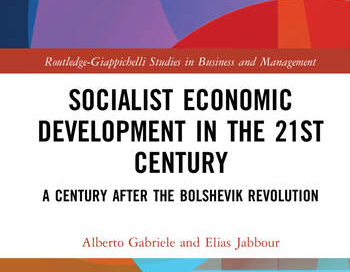Socialist Economic Development in the 21st Century, by Alberto Gabrielle and Elias Jabbour, is recognized as an important book by intellectuals of the global Left, that is, intellectuals from all regions of the world who appreciate the significance of socialist projects in the global South as an empirical foundation for understanding the meaning of socialism. Gabriele is a Senior Researcher at Sbilanciamoci, Rome, Italy. Jabbour is Assistant Professor at the Faculty of Economic Sciences, Postgraduate Programs in Economic Sciences, and International Relations at the State University of Rio de Janeiro.
Gabrielle and Jabbour undertake a reconceptualization of fundamental categories originally formulated by Marx, a reformulation that takes into account developments during the twentieth and twenty-first centuries, including the emergence real socialist projects in the global South. They then proceed to analyze the particular cases of China and Vietnam.
In today’s commentar…


